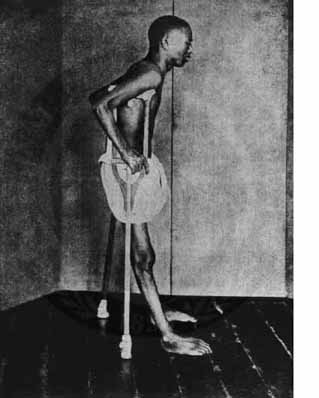- Beriberi
Infobox_Disease
Name = Beriberi

Caption = A sufferer - Turn of the 20th century insoutheast Asia
DiseasesDB = 14107
ICD10 = ICD10|E|51|1|e|50
ICD9 = ICD9|265.0
ICDO =
OMIM =
MedlinePlus =
eMedicineSubj = ped
eMedicineTopic = 229
eMedicine_mult = eMedicine2|med|221 | MeshID = D001602Beriberi (pronounced "Berry-berry") is a
nervous system ailment caused bythiamine (vitamin B1) deficiency. Thiamine is involved in the breakdown of energy molecules such as glucose. It is also found on the membranes of neurons. Symptoms of Beriberi include severe lethargy and fatigue, together with complications affecting thecardiovascular , nervous, muscular, andgastrointestinal systems.Etymology
The origin of the word is from a Sinhalese phrase meaning "I cannot, I cannot", the word being doubled for emphasis. [ [http://www.faqs.org/health/topics/40/Beriberi.html Beriberi, Information about Beriberi ] ]
Causes
Beriberi is caused by a lack of
thiamine (vitamin B1). Thiamine occurs naturally in unrefinedcereal s and fresh foods, particularlywhole grain bread , freshmeat ,legume s, greenvegetable s,fruit , andmilk . Beriberi is therefore common in people whose diet excludes these particular types of nutrition.Beriberi may be found in people whose diet consists mainly of polished
white rice , which is very low in thiamine because the thiamine-bearing husk has been removed. It can also be seen in chronic alcoholics with an inadequate diet (Wernicke-Korsakoff syndrome ), as well as being a rare side effect ofgastric bypass surgery . If a baby is mainly fed on themilk of a mother who suffers from thiamine deficiency then that child may develop beriberi as well.The disease was often found in
Asia n countries (especially in the 19th century and before), due to those countries' reliance onwhite rice as astaple food .Symptoms and effects
Its
symptom s include weight loss,emotion al disturbances, impaired sensoryperception (Wernicke's encephalopathy ), weakness andpain in the limbs, and periods of irregularheart rate .Edema (swelling of bodily tissues) is common. In advanced cases, thedisease may causeheart failure anddeath . It may also increase the amount oflactic acid andpyruvic acid within the blood.* Wet beriberi affects the
heart ; it is sometimes fatal, as it causes a combination of heart failure and weakening of thecapillary walls, which causes the peripheral tissues to become edematous.* Dry beriberi causes wasting and partial
paralysis resulting from damaged peripheralnerve s. It is also referred to as "endemic neuritis".Treatment
Treatment for beriberi is with
thiamine hydrochloride , either in tablet form or injection. A rapid and dramatic recovery within hours can be made when this is administered to patients, and their health can be improved within an hour of starting treatment. In emergency situations where concentrated thiamine supplements are unavailable, feeding the patient with a thiamine-rich diet (e.g.whole grain brown bread) will lead to recovery, though at a much slower rate. Additionally, administering glucose will provide the patient with a temporary boost, while their body recovers.History
In
Asia where polished whiterice was the common staple food of the middle class, beriberi resulting from lack of vitamin B was endemic. In 1884,Takaki Kanehiro , a British-trained Japanese medical doctor of theJapanese Navy observed that beriberi was endemic among low ranking crew who often ate nothing but rice but not among crews of Western navies and officers who were entitled to a Western-style diet. Kanehiro initially believed that lack of protein was the chief cause of beriberi. With the support of Japanese navy, he experimented using crews of twobattleship s, one crew was fed only white rice, while the other was fed a diet of meat, fish, barley, rice, and beans. The group that ate only white rice documented 161 crew with beriberi and 25 deaths, while the latter group had only 14 cases of beriberi and no deaths. This convinced Kanehiro and the Japanese Navy that diet was the cause of beriberi. This was confirmed in 1897, whenChristiaan Eijkman discovered that feeding unpolishedrice instead of the polished variety to chickens helped to prevent beriberi in the chickens. The following year,Frederick Hopkins postulated that some foods contained "accessory factors"—in addition to proteins, carbohydrates, fats, etcetera—that were necessary for the functions of the human body.Jack Challem (1997). [http://www.thenutritionreporter.com/history_of_vitamins.html "The Past, Present and Future of Vitamins"] ]Christiaan Eijkman , a Dutchphysician andpathologist , demonstrated that beriberi is caused by poor diet. His work led to the discovery ofvitamin s. Together with SirFrederick Hopkins , he was awarded the 1929Nobel Prize for Physiology or Medicine for the discovery.References
Footnotes
General references
*
*
* [http://www.ennonline.net/fex/01/fa18.html Diagnosing Beriberi in Emergency Situations] , by Prof Mike Golden, Aberdeen University. (n.d.)
**
*
* [http://www.haitianalysis.com/health Jeb Sprague and Eunida Alexandra. Haiti: Mysterious Prison Ailment Traced to U.S. Rice] - Inter Press Service (IPS). 17 January 2007.*
External links
* [http://www.wrongdiagnosis.com/b/beriberi/symptoms.htm www.wrongdiagnosis.com : beriberi]
* [http://0-www.nlm.nih.gov.catalog.llu.edu/medlineplus/ency/article/000339.htm Medical Encyclopedia] ,Medline ,National Institutes of Health .
* [http://www.emedicine.com/ped/topic229.htm L Arturo Batres, MD. Beriberi.EMedicine.com]ee also
*
Edward Bright Vedder
Wikimedia Foundation. 2010.
